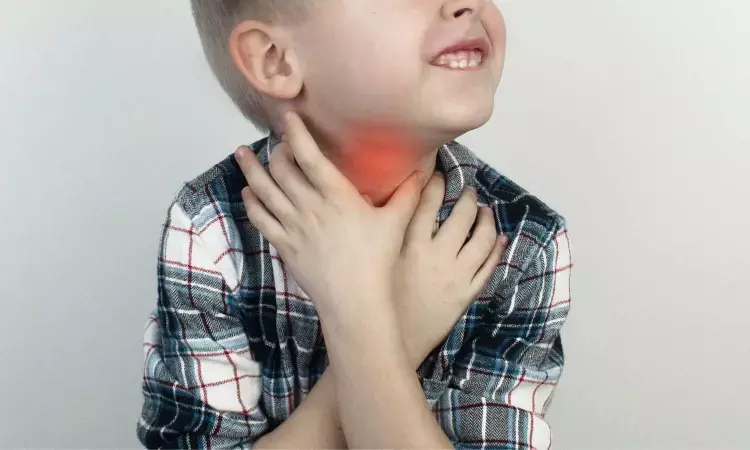- Home
- Medical news & Guidelines
- Anesthesiology
- Cardiology and CTVS
- Critical Care
- Dentistry
- Dermatology
- Diabetes and Endocrinology
- ENT
- Gastroenterology
- Medicine
- Nephrology
- Neurology
- Obstretics-Gynaecology
- Oncology
- Ophthalmology
- Orthopaedics
- Pediatrics-Neonatology
- Psychiatry
- Pulmonology
- Radiology
- Surgery
- Urology
- Laboratory Medicine
- Diet
- Nursing
- Paramedical
- Physiotherapy
- Health news
- Fact Check
- Bone Health Fact Check
- Brain Health Fact Check
- Cancer Related Fact Check
- Child Care Fact Check
- Dental and oral health fact check
- Diabetes and metabolic health fact check
- Diet and Nutrition Fact Check
- Eye and ENT Care Fact Check
- Fitness fact check
- Gut health fact check
- Heart health fact check
- Kidney health fact check
- Medical education fact check
- Men's health fact check
- Respiratory fact check
- Skin and hair care fact check
- Vaccine and Immunization fact check
- Women's health fact check
- AYUSH
- State News
- Andaman and Nicobar Islands
- Andhra Pradesh
- Arunachal Pradesh
- Assam
- Bihar
- Chandigarh
- Chattisgarh
- Dadra and Nagar Haveli
- Daman and Diu
- Delhi
- Goa
- Gujarat
- Haryana
- Himachal Pradesh
- Jammu & Kashmir
- Jharkhand
- Karnataka
- Kerala
- Ladakh
- Lakshadweep
- Madhya Pradesh
- Maharashtra
- Manipur
- Meghalaya
- Mizoram
- Nagaland
- Odisha
- Puducherry
- Punjab
- Rajasthan
- Sikkim
- Tamil Nadu
- Telangana
- Tripura
- Uttar Pradesh
- Uttrakhand
- West Bengal
- Medical Education
- Industry
Lingual Tonsillectomy Carries Higher Risk of Postoperative Complications Than Palatine Tonsillectomy, finds study

Researchers have found that lingual tonsillectomy (LT) is associated with a higher risk of postoperative complications, including increased dysphagia and hospital admission, compared to palatine tonsillectomy (PT). These findings come from a study conducted in the U.S.. The study was published in The Laryngoscope journal conducted by Cottone and colleagues..
This retrospective cohort study was conducted using the TriNetX database-a collaborative network based out of the United States. The LT cohort was defined by using CPT 42870, whereas the PT group was identified by using CPT codes 42820, 42821, 42825, and 42826. Cohorts were divided into adult and pediatric sets, and propensity scores were used to match the groups for comparability. Complication incidence, including postoperative dysphagia, bleeding, hospital admission, and ICU admission within 14 days of surgery, were analyzed by the researchers.
Adult Cohort.
• A total of 1,357 adult patients with mean age 42.9 years were analyzed.
• Adults in the LT group had significantly greater risks of postoperative dysphagia (odds ratio [OR] = 2.6, p < 0.001), hospital admission (OR = 4.3, p < 0.001), and ICU admission (OR = 6.1, p < 0.001) compared with patients who received PT.
• Postoperative bleeding rate was similar between groups: 3.8% of PT and 4.4% of LT patients experienced postoperative hemorrhage (p = 0.50).
Pediatric Cohort:
• The pediatric cohort consisted of 863 patients, with a mean age of 8.1 years. In comparison with PT, LT patients had a greater risk of developing postoperative dysphagia (OR = 2.4, p = 0.017), and were more likely to be admitted to hospital (OR = 8.2, p < 0.001) or to ICU (OR = 2.7, p = 0.012).
• Postoperative bleeding was lesser in LT group 1.5 % than PT 3.2%, and this showed a significant difference with p = 0.016, suggesting that bleeding may be reduced in children under LT.
In conclusion, this large cohort study revealed that lingual tonsillectomy carries a higher risk of postoperative complications in comparison to palatine tonsillectomy, both in adults and in children.Such results indicate that although LT could be indispensable in some specific clinical situations, it requires very careful planning and preparation to manage the increased risk of complications, notably postoperative care and monitoring.
Reference:
Cottone, C., Rosi-Schumacher, M., Gawel, E. M., Corbin, A. F., Riccio, D., & Carr, M. M. (2024). Postoperative complications in lingual versus palatine tonsillectomies. The Laryngoscope. https://doi.org/10.1002/lary.31799
Dr Riya Dave has completed dentistry from Gujarat University in 2022. She is a dentist and accomplished medical and scientific writer known for her commitment to bridging the gap between clinical expertise and accessible healthcare information. She has been actively involved in writing blogs related to health and wellness.
Dr Kamal Kant Kohli-MBBS, DTCD- a chest specialist with more than 30 years of practice and a flair for writing clinical articles, Dr Kamal Kant Kohli joined Medical Dialogues as a Chief Editor of Medical News. Besides writing articles, as an editor, he proofreads and verifies all the medical content published on Medical Dialogues including those coming from journals, studies,medical conferences,guidelines etc. Email: drkohli@medicaldialogues.in. Contact no. 011-43720751


